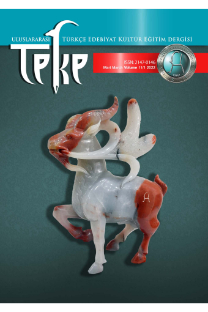Öğretmen adaylarının ideal okur algıları
Literature theories presented till the last quarter of 20th century has carriedout criticism by considering either text, writer or the period of the writer hasgrown up. On the other hand; theories such as reader response theories,reception theory, feminist criticism place the reader in the center of thecriticism. Accordingly, it is necessary to work on concept of reader and todefine perception of participants about ideal reader. The current study isconducted to determine pre-service teachers ideas and evaluation of idealreader . In the study, it is emphasized by the participants that ideal reader isanyone who comprehend, interpret and criticize the text. Moreover, idealreader was perceived as receptor, trainee by participants; that s why, he waslikened to an obese, library, consumer in a market. Nevertheless, friends andfamily members were referred as ideal readers, especially teachers.Furthermore, it can be said that participants have pragmatist perspectiveabout reading and they read for pleasure and information.
The ideal reader perception of pre-service teachers
Literature theories presented till the last quarter of 20th century has carriedout criticism by considering either text, writer or the period of the writer hasgrown up. On the other hand; theories such as reader response theories,reception theory, feminist criticism place the reader in the center of thecriticism. Accordingly, it is necessary to work on concept of reader and todefine perception of participants about ideal reader. The current study isconducted to determine pre-service teachers ideas and evaluation of idealreader . In the study, it is emphasized by the participants that ideal reader isanyone who comprehend, interpret and criticize the text. Moreover, idealreader was perceived as receptor, trainee by participants; thats why, he waslikened to an obese, library, consumer in a market. Nevertheless, friends andfamily members were referred as ideal readers, especially teachers.Furthermore, it can be said that participants have pragmatist perspectiveabout reading and they read for pleasure and information.
___
- AKERSON, F. (2010). Edebiyat ve Kuramlar. İstanbul: İthaki Yayınları.
- AYTAÇ, G. (2003). Genel Edebiyat Bilimi. İstanbul: Say Yayıncılık.
- EAGLETON, T. (2004). Edebiyat Kuramı. İstanbul: Ayrıntı Yayınları.
- ECO, U. (1981). The Theory of Signs And The Role of The Reader. The Bulletin of the Midwest Modern Language Association, 14 (1): 35-45.
- ECO, U. (2008). Yorum ve Aşırı Yorum. (çev. Kemal Atakay). İstanbul: Can Yayınları.
- ECO, U. (2009). Anlatı Ormanlarında Altı Gezinti. (çev. Kemal Atakay). İstanbul: Can Yayınları.
- GÖKTÜRK, A. (2002). Okuma Uğraşı. İstanbul: YKY Yayınları.
- HARRIS T, HODGES R. et. al. (1981). A Dictionary of Reading And Related Terms. Newark, Delaware: IRA.
- ISER, W. (1978). The Act of Reading: A Theory of Aesthetic Response. Baltimore: The John Hopkins University Press.
- JR, Robert D. (1978). The Ideal Reader: A Critical Fiction. Modern Language Association, 93 (3): 463-474.
- KAY, P. (1983). Three Properties of The Ideal Reader. Cognitive Science Program. Institute of Cognitive Studies, Universty of California, Berkeley.
- MANGUEL, A. (2007). Okumanın Tarihi. (çev. Sevin Okyay). İstanbul: YKY Yayınları.
- MANGUEL, A. (2013). Okumalar Okuması. (çev. Sevin Okyay). İstanbul: YKY Yayınları.
- MONTAIGNE (1997). Denemeler. (çev. Sabahattin Eyuboğlu) İstanbul: Cem Yayınları.
- MORAN, B. (2008). Edebiyat Kuramları ve Eleştiri. İstanbul: İletişim Yayınları.
- NABOKOV, V. (2014). Edebiyat Dersleri. (çev. Ayşe Lucie Batur ve Fatih Özgüven). İstanbul: İletişim Yayınları.
- ÖZBAY, M. ve BAHAR, M. A. (2012). İleri Okur ve Üst Biliş Eğitimi. Uluslararası Türkçe Edebiyat Kültür Eğitim Dergisi, 1(1): 158-177.
- ÖZBEK, Y. (2004). Postmodernizm ve Alımlama Estetiği. Konya: Çizgi Yayınları.
- ÖZBEK, Y. (2007). Okumak, Anlamak, Yorumlamak. Konya: Çizgi Yayınları.
- ÖZDEMİR, E. (2013). Eleştirel Okuma. Ankara: Bilgi Yayınları.
- PAMUK, O. (2011). Saf ve Düşünceli Romancı. İstanbul: İletişim Yayınları.
- SARTRE, J. P. (2008). Edebiyat Nedir. (çev. Bertan Onaran). İstanbul: Can Yayınları.
- UYGUR, N. (1985). İnsan Açısından Edebiyat. İstanbul: Remzi Yayınları.
- WILLIG, C. (2008). Introducing Qualitative Research in Ppsychology. (2nd Edt.). New York: Mc Graw Hill Open Universty Press.
- YILDIRIM, A. ve ŞİMŞEK, H. (2008). Sosyal Bilimlerde Nitel Araştırma Yöntemleri. Ankara: Seçkin Yayınları.
- ISSN: 2147-0146
- Yayın Aralığı: Yılda 4 Sayı
- Başlangıç: 2012
- Yayıncı: Cengiz Alyılmaz
Sayıdaki Diğer Makaleler
Öğretmen adaylarının ideal okur algıları
MEHMET EMİN YURDAKUL’UN ŞİİRLERİNDE KADIN
YENİSEY YAZITLARINDA ÇIKMA HÂLİ
KIRGIZ TÜRKÇESİ İLE MOĞOLCA ARASINDAKİ ORTAK BİR EDAT ‘ELE’
90. Yaşı dolayısıyla Prof. Dr. Meşedihanım Sadullahgızı ne'met
PROF. DR. FUAT BOZKURT’UN TÜRK İMGESİ TUTTUM AYNAYI YÜZÜME ADLI ESERİ ÜZERİNE
